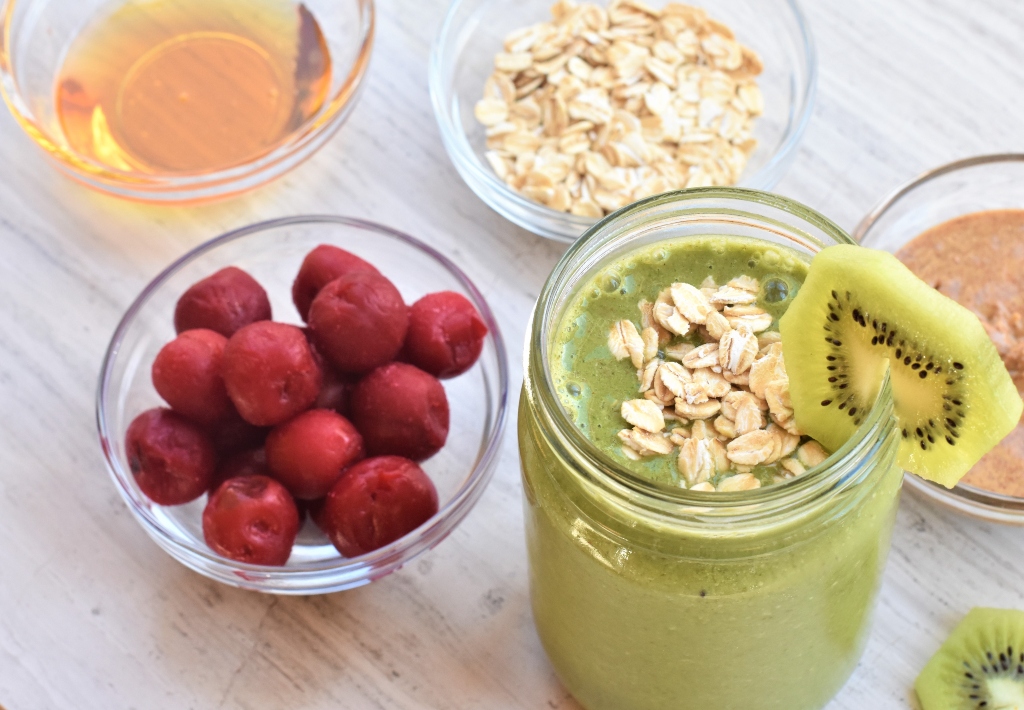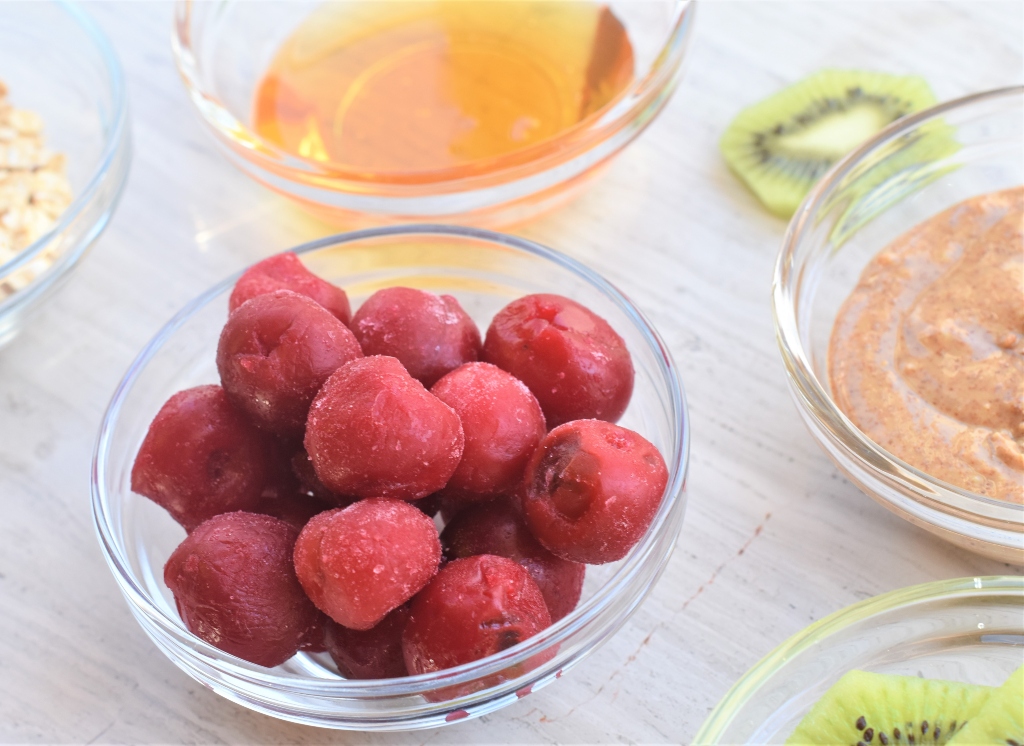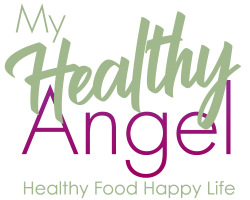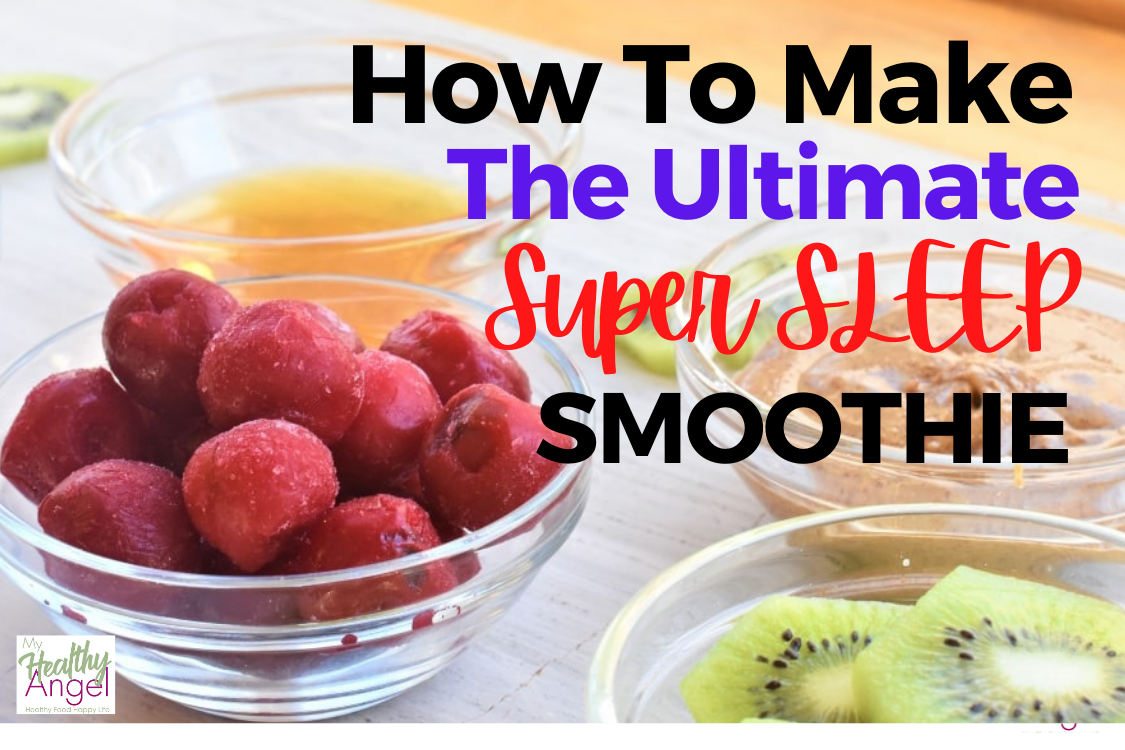The key to the ultimate better sleep smoothie that helps promote better sleep is all about healthy ingredients. Along with having a consistent bedtime routine, that helps you wind down, the nutrients in this bedtime smoothie will help you fall asleep and stay asleep.
This smoothie isn’t necessarily for right before bed. In fact, I have this smoothie for breakfast. The point is to get these nutrients in your system for a more restful night of sleep.
8 Smoothie Ingredients for Restful Sleep
1. Spinach
The key sleep-enhancing nutrients in spinach are vitamin C and magnesium.
Vitamin C has been shown to promote better sleep quality and longer sleep time. A 2013 study showed those that who slept 6 hours or less a night had lower levels of vitamin C. Lower levels of Vitamin C were also linked to sleep disturbances and disorders.
The mineral magnesium helps you sleep by relaxing the brain and body. It does this by activating the parasympathetic nervous system which helps get you calm and more relaxed. Magnesium naturally relaxes the nerves and muscles and can also help prevent leg cramps, a common cause of nighttime waking.
2. Bananas
The nutrients in bananas that help promote healthy sleep include magnesium, potassium and tryptophan, and melatonin.
The potassium and magnesium in bananas are both natural muscle relaxants. One double-blind study also showed the potassium in bananas to promote longer sleep as well. To give you an idea of nutritional value for these nutrients:
One large banana contains 487 milligrams of potassium – roughly 10 percent of the adequate intake of this mineral for adults.
One large banana has 37 milligrams of magnesium – roughly 12 percent of the adequate intake for women and about 9 percent for men.
Tryptophan is an amino acid that helps you get to sleep. Tryptophan converts to serotonin, a sleep-promoting neurotransmitter. Bananas also contain the hormone, melatonin, known as the sleep hormone.
3. Tart Cherries
These red little beauties are one of the few natural food sources that contain melatonin. Melatonin is known as your sleep hormone. It’s produced naturally in the pineal gland in the brain. Production of melatonin increases with darkness while light stops production.
Once melatonin production starts in the evening it helps your body transition to sleep and overall helps regulate the sleep-wake cycle. One study involving men and women with insomnia, found that consuming 8 oz of tart cherry juice in the morning and again 1-2 hours before bed increased sleep time by an hour and 24 minutes!

4. Kiwi
Kiwi fruit is rich in serotonin, antioxidants like Vitamin C, and potassium.
We’ve heard already potassium helps relax your muscles. Serotonin is a brain chemical that helps regulate your sleep cycle. Vitamin C helps promote a better and longer sleep.
5. Rolled Oats
Oats are another good source of melatonin which relaxes the body and muscles to help you fall asleep.
6. Almond Butter
Studies have also shown almonds to be effective in improving sleep quality. This is because almonds are rich in melatonin. Are you starting to see some themes here now? We’ve heard it before, melatonin (also in tart cherries and bananas), helps regulate your sleep cycle and transition you to sleep.
Almonds are also a great source of magnesium which relaxes muscles. In fact, one ounce of almonds provides 19% of your daily needs. One study showed that consuming adequate amounts of magnesium may have a positive impact on improving sleep quality, especially for those with insomnia.
Last, magnesium may lower levels of your body’s stress hormone called cortisol, which is known to interrupt sleep.

7. Plant Protein Powder
Plant-based protein powdered contains a good amount of the amino acid tryptophan, which is a precursor to melatonin and serotonin, two neurotransmitters involved in sleep regulation.
To put this all together, tryptophan travels through the bloodstream into the brain where it changes from L-tryptophan to another chemical called serotonin. Serotonin in turn, calms you down and helps you sleep.
8. Raw Honey
This is a tip if you’re having the smoothie closer to bedtime. Raw honey provides easy-to-access fuel for your brain during the night. You need this because low levels of glycogen could wake you up and tell your brain it’s time to eat!
5 more tips for restful sleep
Get Natural Sunlight During the Day
This helps your body’s circadian rhythm cycle. Getting natural sunlight during the day, helps you feel more awake during the day and get a better night’s sleep at night.
Reduce Blue Light Exposure During the Evening
Natural sunlight is good during the day but nighttime exposure to light reduces or prevents your body from starting the melatonin production which helps you fall asleep and get a good night’s sleep. Try reading before bed, turning off your phone an hour before bed, and wearing glasses that block blue light.
Adopt a Sleep Schedule (and stick to it!)
Your body’s circadian rhythm works best with a set sleep schedule. Studies have shown that having regular sleep patterns where you go to sleep and wake at the same time, can impact overall sleep quality and duration.
Develop a Bedtime Routine
It’s just as important to develop a “wind-down” routine before bed. Make a plan that an hour before bed, you’ll be doing something that settles down your system and prepares you for rest. Maybe it’s reading, taking a hot bath, washing your face or meditating, or snuggling with a loved one!
Important Sleep Terms
Sleep goals can be all over the board from just getting a good night’s sleep to recover from a hard workout to longevity and healthy aging for the body and brain. Whatever your goal, sleep is massively important. So, it’s important to understand the cycles of sleep too.
I just invested in a Garmin VENU SQ to track my activity and one of the big reasons I purchased it is it’s and landslide against Apple on monitoring sleep – sorry “Apple” I love you but, love good sleep more!

Stages of Sleep
Sleep stages 1, 2, and REM are light sleep while stages 3 and 4 are deep sleep.
Stage 1
At this first stage, you go back and forth from being asleep. You start to relax, dream and might twitch or jerk as you transition to stage 2.
Stage 2
This is still a light sleep stage, but you’re drifting into steadier sleep and breathing. At this point, your breathing and heart rate slow and muscles relax. Brain waves are also less active and your body temperature drops.
Stages 3-4
Stage 3 is where you’re entering deep sleep while in stage 4 you’re fully in the deepest sleep stage. Your heart rate, breathing, brain waves, and body temperature reach their lowest levels. Let’s stop here and talk about Stage 4. This is your healing stage where tissue growth and repair take place, hormones are released, and cell energy is restored.
Stage 5 or REM Sleep
REM (Rapid Eye Movement) sleep usually happens about 90 minutes after you fall asleep and reoccurs every 90 minutes or so. During REM, your eyes are moving behind your eyelids and brainwaves are like when you’re awake. Your breathing, heart rate, and blood pressure are close to the levels when you wake up.
REM sleep is the sleep where you have the most dreams. Ironically your body becomes temporarily paralyzed during this stage to keep you from acting your dreams out.
How Much of Each Stage Should You Get?
Deep Sleep (Stage 4)
The average adult needs 1-2 hours of deep sleep a night per 8 hours of sleep. It’s the most essential of all stages for rest and recovery.
There is some research that you need less deep sleep as you get older. But then again, can you ever have too much of a good thing?!
REM Sleep
There isn’t an official consensus on how much REM sleep is needed. Experts believe, however, that some amount of REM sleep is necessary to process emotions and solidify memories.
Light Sleep
Again, there isn’t a rock-solid number her but you need light sleep to get to deep sleep, it’s a right of passage, so there you go!
The Ultimate Better Sleep Smoothie
The key to the ultimate better sleep smoothie is all about healthy and clean ingredients.
Ingredients
- 1 1/2 cups spinach
- 1 frozen banana
- 1 frozen kiwi
- 3/4 cup frozen tart cherries
- 1 scoop plant-based protein powder (vanilla)
- 2 tbsp organic gluten-free rolled oats
- 1 tbsp almond butter
- 1 tbsp raw honey (manuka if available)
- 1 1/2 cups coconut water
Toppings (optional)
- 1 tbsp rolled oats (toasted if available)
- 1/2 tbsp drippy almond butter
Instructions
-
Add all ingredients to a high-powered blender and blend on high until smooth. Scrape down the sides then blend for 30 seconds again.
-
Pour into a glass and sprinkle with desired toppings. Serve immediately.
Recipe Notes
Feel free to substitute ingredients, just know that these ingredients were handpicked for their sleep nutrients.
In the mood for another smoothie?
Try one of these!
5-Minute Energy-Boosting Smoothie
My Favorite Anti-Inflammatory Smoothie
Turmeric & Ginger Anti-Inflammatory Smoothie
Sweet Dreams!


